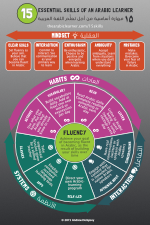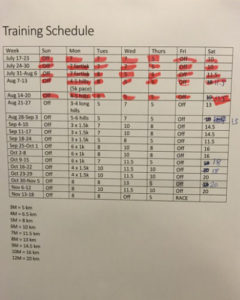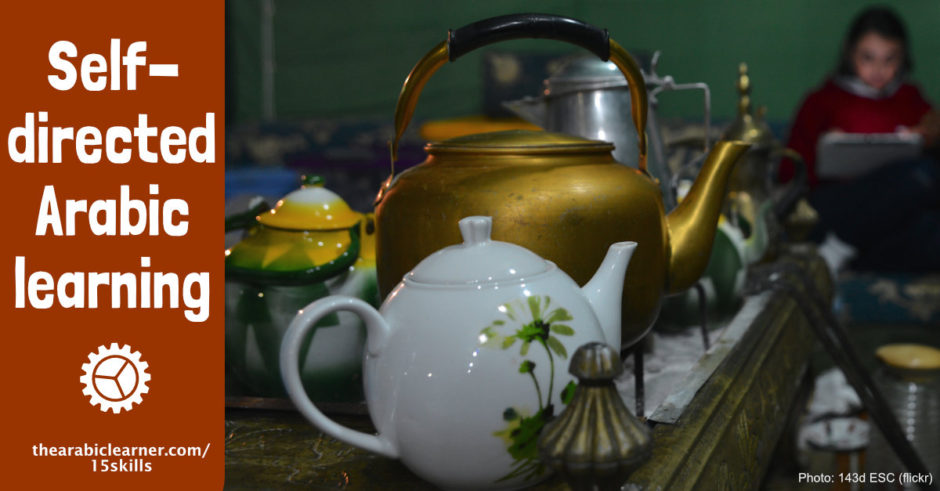 Take charge of your own Arabic language acquisition by directing your own program of self-directed learning. Many times, you may not have access to classes or programs that provide you with the kind of instruction that you would like to have, and will need to customize your own approach. Even when you are actively engaged in class work, take control of your learning by building your own self-led framework of Arabic instruction that combines multiple learning strategies into an overall plan.
Take charge of your own Arabic language acquisition by directing your own program of self-directed learning. Many times, you may not have access to classes or programs that provide you with the kind of instruction that you would like to have, and will need to customize your own approach. Even when you are actively engaged in class work, take control of your learning by building your own self-led framework of Arabic instruction that combines multiple learning strategies into an overall plan.
“…those learners that are self-directed and highly motivated will jump on these opportunities…” (Aiyub Palmer)
This article is based on the 15 Essential Skills of an Arabic Learner.
Design your own self-directed learning experience
For most of us, when we set out to learn Arabic we don’t think of self-directed learning. Our first step is to research what programs and institutes are available to take us where we want to go. We look for the best instruction we can possibly find. We hope for a solution that includes all of the features we will need to be successful, including great materials, skilled teachers, opportunities for practice, and practical application of the skills we learn.
What we are looking for is a person or program that will lead us in our Arabic language learning. The problem is that it is hard to find people or programs like this. Which is why we need to be ready to engage in self-directed learning. Self-directed learners can design their own Arabic language learning experiences.
I distinctly remember when my first year and a half of “official” Arabic language learning at the American University in Cairo came to a close. I had reached a point where I did not have the time or focus needed to stay in the program. But I recall thinking something along the lines of “this should be easy – I live in an Arabic speaking city and I’ll just keep growing in my Arabic as I use it”. While living in an Arabic speaking environment has been helpful, I came to realize that there’s a lot more to successfully learning the language than just soaking it in. To be successful, you need to be a self-directed learner.
Self-directed learning, whether for a language or any other area, means that “the learner takes responsibility for their learning, choosing the content, resources, time, place, activities, and pace of their learning” (SIL.org) . It doesn’t necessarily mean that you learn alone, but that you make the key decisions that organize and direct your learning experience.
In the words of Aaron Myers, in his article How to Make Self-Directed Language Learning Work, “the learner assumes complete responsibility and accountability for defining the learning experience and following it through to its conclusion. This does not preclude input from others, but the final decision is the learner’s”.
Being a self-directed learner takes a bit more work, but the payoff is exponential. Being a self-directed language learner does not mean you can’t be enrolled in a language study program at an institute. It means that whatever Arabic learning situation you find yourself in, you are taking responsibility for your own learning. You are making the key decisions, choosing how to focus your time, evaluating your own progress, and engaging in your learning.
The Center for Teaching Excellence at the University in Waterloo (in my own native Ontario), outlines four key areas for self-directed learners to consider. These four areas include:
- Readiness to learn
- Setting personal learning goals
- Engaging in your learning
- Evaluating your learning
Let’s take a quick look at each of these.
Readiness to learn Arabic
In the 15 Essential Skills of an Arabic Learner, the first five skills that I talk about are all focused on the idea of being psychologically prepared for learning Arabic in a way that maximizes your efforts. I have dealt with each of these skills in more detail in my blog posts. They include:
- Setting fluency as your aim
- Committing to interact in Arabic
- Being enthusiastic
- Accepting ambiguity
- Making mistakes when learning Arabic
If you have not had a chance to read through these detailed posts, feel free to do so whenever you have a few minutes. They will help you develop a successful mindset for learning Arabic, and for being a self-directed learner.
Setting personal learning goals
The importance of setting personal learning goals is hard to over-state, if you want to be an effective learner.
 As an example of this, over this summer I have launched myself into a training process to run in the 100km Pharaonic Race in November, as a part of a team (I will run 20km, not the full 100!). I have been mulling doing this for a few years, but this year I did something different. I set the goal of running the race in front of me on paper. I did some research and came up with a training structure and sequence. I set a clear timeline with weekly and daily goals. And I bought a new pair of shoes.
As an example of this, over this summer I have launched myself into a training process to run in the 100km Pharaonic Race in November, as a part of a team (I will run 20km, not the full 100!). I have been mulling doing this for a few years, but this year I did something different. I set the goal of running the race in front of me on paper. I did some research and came up with a training structure and sequence. I set a clear timeline with weekly and daily goals. And I bought a new pair of shoes.
This morning I ran 12 km before breakfast. The difference in my achievement this summer has been in the way I have set specific goals and then worked on them. This kind of approach can work for you as you learn Arabic.
Start by defining your overall goal. In order to do this, you need to narrow down your “main thing” into a clear and workable goal. There’s many things you CAN do. But you need to choose a single direction and stick with it. Matthew Manning of the Uncollege blog calls this “getting over multitasking paralysis”.
Once you have done that, set goals for specific units of study. Break it down into unit sized goals. Are you studying a dialect? Perhaps you would like to create unit-sized goals related to everyday tasks. Learning Modern Standard Arabic? Some people might like to set grammar-based goals (for example, one new grammar structure each week). Others might like to base their goals around vocabulary, or certain types of discourse. There are no right or wrong goals. It is up to you. It is self-directed. But in order to direct yourself effectively, be specific in your goals. Write them down.
At this point, you can go deeper into each unit and determine specific structures and sequences of activities (Center for Teaching Excellence) . Assign little, measurable steps (Matthew Manning). Set timelines for completion. Gather any materials needed, including pre-made materials that can help you.
Engaging in your learning
Self-directed learners engage in their learning with a high level of enthusiasm and focus. When you have taken time to think through and define your learning goals and program, motivation becomes much easier.
There are many people who write about this aspect of engaging in your self-led learning[1]. Here’s a summary of some points that I have found helpful:
1. Determine your preferred learning method
Each person has characteristic preferences in the way that they process and digest information. As a self-directed learner, find which style most often suits you and tailor your approach accordingly. Here’s a good overview of the various learning styles.
2. Use basic study skills
Skills like taking notes, making study sheets, and all the other things that you had to suffer through back in school. They do help!
3. Organize your time

4. Set an appropriate pace
Learning any skill well requires a marathon pace, not a sprint pace. Skilled self-directed learners recognize the need to pace themselves for the long term.
5. Try out different tools that can help you work and focus
I have found a number of apps and tools that have been really helpful for me in my own learning (and overall productivity), as well as for many of my students. These include workflowy.com, Self Control (a free Mac app), and the Pomodoro technique. These might or might not be helpful for you, but the point is to find your own tools that make you more effective.
6. Get help from your peers
Self-directed learning doesn’t mean solitary learning. Find people who will help and support you. Some of these may exist in real locations near you, and some of them may be found online in learning communities. I have personally found the learn_arabic subreddit on reddit.com to be one such place. Here are a few other suggestions from Aaron Myers:
- http://how-to-learn-any-language.com/forum/default.asp
- http://www.omniglot.com/forum/viewforum.php?f=2
- http://www.fluentin3months.com/forum/
- http://www.mezzoguild.com/forum/
Evaluating your learning
A final area that is essential for self-directed Arabic learning is evaluation. In order to understand whether or not you are making progress, you need to have a way (and a habit) to measure it.
Measuring your progress has a number of advantages. It helps you see what is working or not. It enables you to plan out your next steps. And, perhaps most importantly (for me, anyway), it is incredibly motivating. When I have a sense of what progress I am making (or even that I am not making in the way that I would like to), it increases my drive and energy to learn more.
The best kind of feedback to help you measure your progress is self-reflection. Most students, and many teachers, do not realize the power of self-reflection for learning. This is where you sit down at your computer, or with a paper and pen, and ask yourself reflective questions. When done regularly, it can be a very enjoyable and motivating experience, even as it boosts your learning.
Here are 5 questions to reflect on, as you evaluate your Arabic learning experience (Center of Teaching Excellence):
- What have I learned?
- How does it show?
- Do I have confidence explaining the material to someone else?
- Have I met my goal?
- How have I been learning? What has been working for me? What needs improvement?
A second type of feedback that is helpful is input from a teacher or coach. But in order to be helpful to you in your self-directed learning experience, it needs to be a certain type of feedback. Direct observations of your performance, with nonjudgmental data (for example, number of times you made a mistake with a certain type of verb, ways in which you transitioned between topics, etc.), are most helpful. Personal opinions and general judgments (“you did a great job!”) are the least helpful.
Conclusion
If you want to learn Arabic, then your best approach is to take an active, self-directed approach to your own language learning. You are the only one who can truly take responsibility for your own learning. Teachers and resources can only get you so far, if you take a passive approach to your learning. By engaging with the content and resources available to you, and by exercising your own control and choice over the time, location, and pace of your learning, you will be able to accelerate and improve your Arabic learning process.
[1] For this list, I draw on Aaron Myers, Matthew Manning, Jeff Cobb, and the Centre for Teaching Excellence at the University of Waterloo.


 RSS - Posts
RSS - Posts